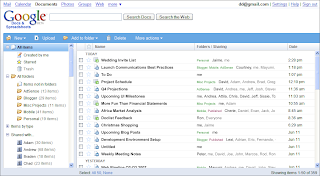
One of my first blog posts after I went through the
Google Teacher's Academy was written in response to
David Warlick's Keynote Presentation at the Monterey
CLHS/
CUE Conference last November. In the presentation, Warlick spoke about the idea of a '
Flat Classroom' (original blog post 4/06) in reference to Thomas Friedman's book, "
The World is Flat." In referencing David's original post, he mentiones that the source of power in the typical classroom was provided by the teacher in the form of gravity. The teacher was superior (on top of) to the students in the fact that he/she had 'educational expertise' in their subject matter, was located in the front of the room being the focal point of classroom activities and in some cases had an elevated platform to teach from.
There have been a few examples of 'flat classrooms' in the past year, including
Vicki Davis' awesome "
Flat Classroom Project" with a
school in Bangladesh.
The newest version of
"The World is Flat" (3.0) has recently come out, and while I haven't personally read the new version of the book, there are a few news articles that point to the directions that Friedman sees a 'flat educational' system coming into form.
A round table discussion with Friedman and several other notable industry leaders in December 2006 pulled these four characteristics of a 'Flat Educational System."- The uber-skill will be the ability to learn as technology gets outdated quickly.
- Those who have a high curiosity quotient and a high passion quotient learn better than those who test well.
- Navigational skills will be important. "Every mouse should come with a warning -- judgment not included," he said. "The Internet is an open sewer of good and bad information." Many people can't tell the difference.
- Right-brain work will prevail. Everything done today by a person's left brain will in the future be done faster by a computer or cheaper by someone in India.
Over the past three days, a few posts by
David Warlick,
Will Richardson and
Wesley Fryer have addressed these issues in different ways. Each of them, in their own way, has posed basically the same question. Can the current educational system change itself enough to meet the needs of students in schools today, or do we need to scrap the current system and build something new?
I pulled out another Kathy Sierra graphic to illustrate part of the process education is going through right now dealing with these issues. In this graphic, the users are the teachers. The problem is that we have too many teachers on the blue curve, instead of the purple one. We have engaged in multiple forms of professional development for technology integration for teachers, but there is always a barrier that keeps them from getting past the 'Suck Threshold.' If you ask most teachers about technology integration they usually fall into two camps. One group is the one that has interest, but not enough access. And the other has access, but not enough interest.

So, how do you get teachers up to the 'passion threshold' in Kathy Sierra's graphic? If you scroll back up to the top of this article, one of the things that Friedman mentioned regarding the future of education was 'passion.' I just finished reading
Will Richardson's 'Raw Food' post and the point ended up being following your passion and the ability to teach yourself. So, we have identified 'passion' and one of the key ingredients in the future of education. This also connects with the ideas set forth in
Daniel Pink's book, 'A Whole New Mind.' In reality, we are asking teachers to give up being the source of student learning and become the catalyst of the informational chemical reaction inside of each student. Teachers need to assist students in learning on their own and guiding them to find their personal passions. Students will make their own connections, instead of the one's teachers want them to have. School systems, by definition cannot do this, since there is a test that evaluates their effectivness that is published in the local newspaper and is the source of status by students and teachers. The lack of control is terrifying for most teachers, since they were trained to be the source of student information and now there is a source that is accessible 24/7/365 from any home, public building and cell phone.
I personally see the process much like coaching an athletic team. A coach can run through a set of drills to develop certain skills, but when the game begins, players must decide which skills to use to complete a particular task. As athletes move up the levels they are rewarded based on their personal initiative by the amount of practice they do on their own and the flexibility and creativeness they use to play the game. Personally, I am a big baseball fan and the watching
Omar Vizquel play shortstop for the Giants the past two seasons illustrates this point.
Teachers... be the chemist, the coach, the mentor or the sage, but take yourself out of the role as the sole source of information for your students.

